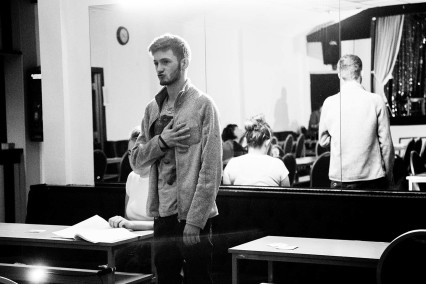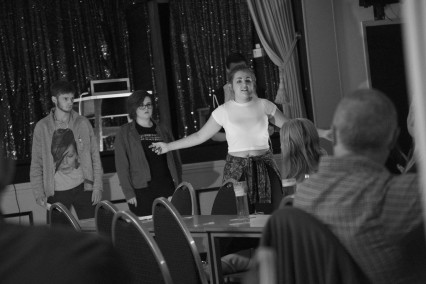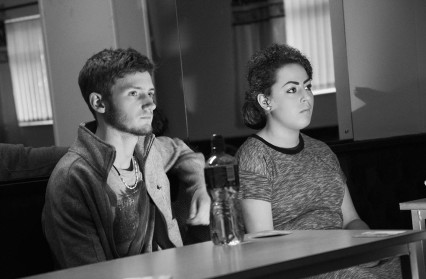Phil Morris reviews Everything Must Go directed by Rhiannon White, a play written by Patrick Jones in 1999 as a corrective to the political promise that things would only get better.
Arthur Miller once said that he wanted his plays “to make people feel less alone”. The message to young people from politicians in London and Cardiff, is that you are very much alone in your struggle to gain education, employment and decent housing. The institutions of British society, from the NHS to the BBC, are being devalued and derided in order to increase this sense of isolation. In this destructive age of austerity, plays that make people feel less alone are an urgent necessity, particularly so in valley towns like Blackwood in Gwent.

Theatre Director Rhiannon White recalls vividly the impact of Patrick Jones’ play Everything Must Go on her teenage consciousness when it opened at the Sherman Theatre in 1999: “It was the first play that spoke directly to me – to make me feel that theatre could be for people like me”. At that time, Wales was in thrall to New Labour and Cool Cymru; two nebulous concepts that sold Tony Blair’s ‘Third Way’ to a nation battered by Thatcherism, and thousands of copies of the Western Mail to fools who thought Cerys Matthews thanking the lord she was Welsh constituted a watershed in Welsh national identity. Everything Must Go was an excoriating and scabrous corrective to the promise that things would only get better; it raised a quizzical eyebrow at the self-congratulation of the Welsh media that a few bands were making it big in the charts, and posed the big question of how Labour would respond to the failure of the beleaguered welfare state to tackle Beveridge’s famous five giant evils: Want, Disease, Ignorance, Squalor and Idleness.
Patrick’s play, like his poetry, was fuelled by rage at the blights of addiction, suicide, chronic unemployment and the abuse of worker’s rights that continue in his native Gwent valleys and beyond. Everything Must Go was his bilious counter-narrative to the giddy, misplaced optimism of the early Blair years, and to many it seemed strangely out of step with its time. It played to good audiences at the Sherman Theatre before touring Britain’s major cities in 2000, but was never performed again.
While the play pre-empted the failure of Blair’s governments and the nascent Welsh Assembly to revive the post-industrial economy of the Welsh valleys and adequately address its social problems, it has acquired an even greater relevance and urgency with the aggressive implementation of swingeing ideologically-based spending cuts by recent Tory administrations in London. Rhiannon and Patrick decided it was time to collaborate on devising a radically updated version of Everything Must Go, with the participation of young actors from Gwent who would contribute their own words and experiences, and a research and development grant from Arts Council Wales. The preliminary results of this ongoing work in progress was staged at Blackwood’s Woodbine Club as part of the Velvet Coalmine festival. As Patrick stated with his usual pugnacity, “The play that challenged the zeitgeist is coming home kicking and screaming, and this time the gloves are off!”
The current collaboration is of profound artistic, political and personal significance to both director and writer, as Rhiannon explains: “After seeing Patrick’s play I wrote some poems and sent them to him, and, incredibly, he was kind enough to reply back with encouragement in a nurturing way. It was great to have someone like Patrick believe in me, or just be there to listen”. Patrick is a little uncomfortable at being cast in the role of mentor, “I didn’t consciously see myself that way,” he says, shifting about awkwardly, “It was just my natural response. I’d get a nice letter now and then with these poems and I’d just fire back.” After corresponding for a while, the pair lost touch before finding each other again, fatefully as it turns out, on the day of Margaret Thatcher’s funeral. Rhiannon remembers, “I was at a party in celebration somewhere in Newbridge, and Patrick got up and did a reading there and I was just blown away. I went up to him later and said ‘I have this theatre company…’ And a few years later here we are”.

The possibility of simply reviving the original play was rejected by Patrick, “I felt that any new staging of the play had to have new scenes, new material in it that explored the problems that young people face today, and what they feel is important to them”. He decided with Rhiannon to devise new material in creative workshops, involving young actors and musicians from Blackwood and the surrounding communities. Rhiannon explains: “We’re using Patrick’s original text as a starting point – many of the issues he wrote about in 1999 are still relevant today. We picked a few scenes and explored them with our young cast. We got each of them to respond to the scenes by writing their own material, which then fed into Patrick’s to become something new.” The aim was not to make minor cosmetic changes to the original play but to channel its spirit, as Patrick makes clear: “If someone saw Everything Must Go fifteen years ago they might not recognise it in this workshopped material, which is good, that’s what we want. This is a great opportunity to create a new play around the spine of something that already exists.”
The breathless and rather frenetic showcase of this workshopped new material indicates rich potential for a fiercely-impassioned and sharply topical piece of immersive agit-prop to emerge from the devising process. There is the intriguing possibility that Jones’ personal and plaintive Cri de Coeur could be opened up, with the involvement of young performers as co-creators, to say something wider, more complicated and arguably deeper about what is being done to our nation’s youth in the name of reducing the size of the state and letting markets run our economy for their own self-interests. The new version of Everything Must Go seems more intensely focused on the harsh realities of daily life for young people in the valleys, as opposed to the delivery of poetically stylised speeches expressing spiritual and political despair. Patrick recalls coming across one seventeen-year-old girl at a workshop at a local youth hostel, “She’d turned up by there with no shoes on her feet. Her parents had just chucked her out and she had nothing. Those sort of things show where we’re going to end up if there’s no housing benefit for under twenty-one-year-olds.”
One of the members of the young cast, Rhiannon Owens, explained after the performance that, while she had not suffered the harsh poverty depicted in some scenes of the play, she had “grown up with many people whose situations are like that” and wanted to participate in the project to show “that these people’s lives are complicated and shouldn’t be oversimplified by labels”. As this quote from the updated text of Everything Must Go makes clear, there is great anger among the alienated youth of the valleys that, in addition to being made victims of government policy, they are also being blamed for their own desperate plights and limited opportunities.
“Go on label us. We are the shirkers, the skivers, the benefit cheaters, the zero hour workers, the bedroom-taxed, credited to the max, the sanctioned suicides, big society lies, the scared scapegoats, weed dealers, foodbank feeders. We are the pound-stretchers, quick-quiders, unliving wagers, medieval survivors.”
According to director Rhiannon White, “The voices of these young people and their honesty is absolutely integral to the piece. These kids are living the struggle every day and we want to use as much of their words as we can.”

What comes across in these reworked scenes, with alarming clarity, is that an economic and political civil war is being waged against people across the United Kingdom, especially the young and particularly so in post-industrial communities like Blackwood. The weapons deployed in this war are aggressive social engineering, media demonisation, political alienation and the brutality of laissez-faire labour markets. Meetings with benefits advisors present traps for the unwary, zero-hours contracts provide little or no security and so the social fabric of the community gradually frays. In this context, the nihilist futility of setting fires among the beautiful landscape of the valleys can be read as an expression of hopelessness that results from the social vandalism of savage government cuts.
The notion that art and culture can be separated from politics and society is a complacent illusion, they are inextricably intertwined. The ongoing redevelopment of Everything Must Go, promises to be a course through which the youth of the valleys might channel their understandable anger and frustration in a productive manner. As a project in which experienced theatre practitioners have collaborated with young and novice performers, an eventual staging of the play in the area – perhaps in a tour of working-men’s clubs across the valleys – would stand as an empowering symbol of the area’s potential for creativity and the nurturing of its latent talent.
Patrick points to the example of the Velvet Coalmine festival as a timely reminder of how culture can socially and spiritually reinvigorate a community: “Isn’t it great that we’ve got all of these bands playing in Blackwood; Dub War, The Meat Puppets, people like that. It’s taken us a long time to host a big cultural event here in Blackwood, and I think it’ll have a knock-on effect on our young people. They can go down the Stute to see a brilliant band or put on a play in the Woodbine Club.” Rhiannon agrees enthusiastically: “That’s what we’re doing with this play – saying to local people that if you want to put on a play in a social club in Blackwood, you can just do it. You can all be actors, we can all sing, we all have stories to tell”.
A revamped and rewritten Everything Must Go, restaged as an immersive theatre experience, could prove to be a welcome catalyst for vocal protest among the youth of the Welsh valleys. If they continue to be marginalised and ignored by society why should anyone expect them to fulfil any obligation of citizenry? To paraphrase Arthur Miller, something terrible is happening to them and attention must be paid.
(Photo credits: Janie Jones)
Everything Must Go 2015 – A Work in Progress
Woodbine Club, Blackwood
Director – Rhiannon White
Writer – Patrick Jones
Cast – Andrew Creak, Ashley Heron, Abbie Miola, Rhiannon Owens, Evan Jones and Ethan Jones (Music)
Phil Morris is a regular contributor to Wales Arts Review.












